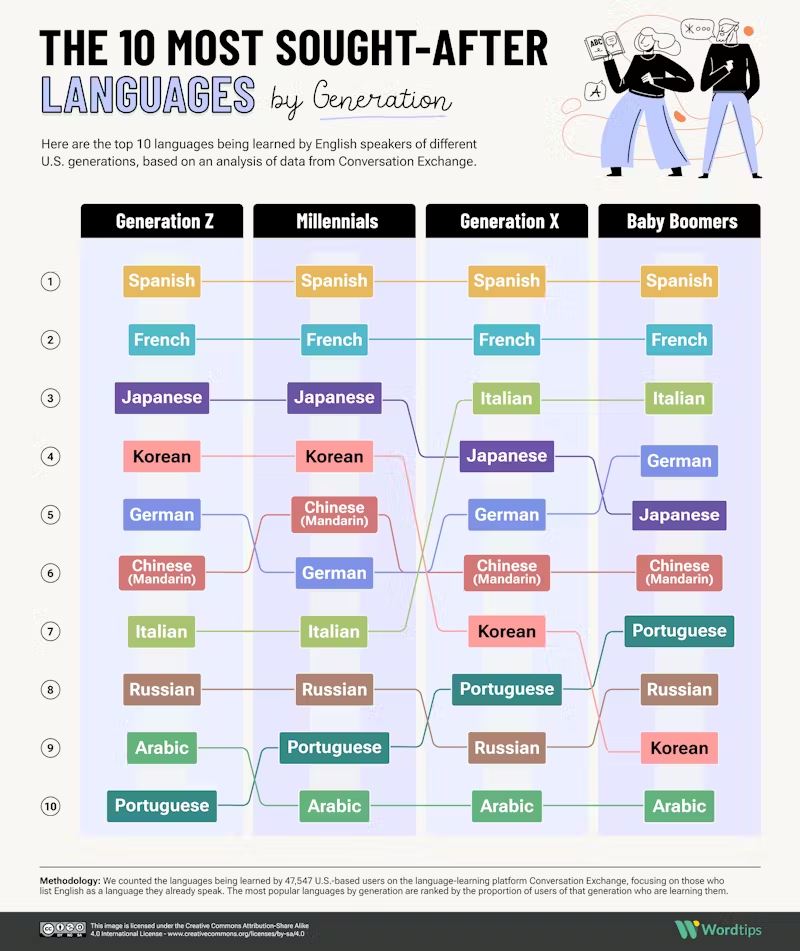If you could instantly speak another language, which one would it be?
That question isn’t just a thought experiment—it’s at the heart of a new global study by WordTips.com, which analyzed data from nearly 300,000 users of the Conversation Exchange platform. The findings offer a window into the world’s linguistic aspirations, revealing what languages people in capital cities from Bogotá to Baku are most eager to master—and why.
In a world of over 7,000 spoken tongues, the results might surprise you
English Still Reigns—But It’s Not the Only Star
From Tokyo to Tunis, English is the undisputed global frontrunner. In 52 world capitals, it’s the most popular language to learn. That includes cities where English is not widely spoken, such as Kyiv, Rabat, and Phnom Penh—underscoring English’s role as the international language of business, science, and culture.
But this isn’t a monocultural story. In London, Spanish tops the list, with nearly 30% of learners opting for it—likely due to the UK’s strong ties with Spain and Latin America. In Singapore and Canberra, Japanese has taken center stage, fueled by the widespread popularity of anime, manga, and J-pop.
French and German: The World’s Second Language Choices
French continues to hold sway in much of the world, ranking as the second-most popular language in 27 capital cities across Africa, Europe, and Latin America. This is no accident: French is an official language in 29 countries, and its influence stretches across education, diplomacy, and global institutions.
In Ottawa, where French is one of Canada’s two official languages, it’s the top language being learned. But French also appears as a second-choice language as far afield as Lima, Bogotá, and Bangkok—showing its enduring appeal among learners seeking a global linguistic passport.
German, too, appears prominently on the map, coming first in 14 capital cities—including Cairo, where Germany’s ambassador touts language learning as a gateway to higher education and economic opportunity. From Nairobi to New Delhi, the study finds, learners see German not just as a cultural asset but as a practical investment.
Asia’s Cultural Powerhouses Inspire the Next Generation
Zoom in on the younger generations, and a clear pattern emerges: Gen Z and Millennials are flocking to Japanese and Korean.
These aren’t just linguistic choices—they’re cultural ones. From the global explosion of BTS and BLACKPINK to the Netflix-fueled boom of K-dramas and anime, Asian pop culture is reshaping language priorities. In cities like Singapore, Seoul, and even Berlin, learners are immersing themselves in Korean and Japanese as a way to connect more deeply with the art, identity, and aesthetics they love.
And in reverse, learners in Tokyo and Seoul are working just as hard to learn English—underscoring the two-way cultural exchange at play.
Russia’s Lingering Influence—and the Role of Heritage
Some choices are geopolitical. In Baku, Azerbaijan, Russian is the top language to learn—not because of K-pop or colonial hangover, but because Russian remains a powerful regional lingua franca. It’s still essential for business, migration, and education in parts of the Caucasus and Central Asia.
Elsewhere, language learning is more personal. In Buenos Aires, Paris, and Istanbul, popular choices often reflect diasporic ties and family heritage. A significant number of learners are seeking to reclaim lost languages—Italian for Argentine descendants of southern Europe, Armenian in Beirut, or Arabic in Paris.

What the World’s Language Desires Reveal
The most striking part of this research isn’t the dominance of English—it’s the diversity just beneath the surface.
In a globalized world, people are learning languages for wildly different reasons: to get ahead at work, to better understand their favorite music, to prepare for travel, to reconnect with ancestry, or simply to feel less like a tourist and more like a citizen of the world.
If language is power, then learning another is one of the most human forms of aspiration. And in an era defined by border anxiety and digital overwhelm, language learning stands as a quiet act of connection—one verb, one noun, one conversation at a time.





